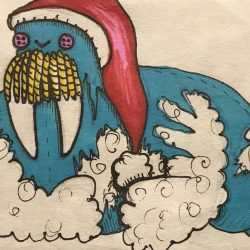Show Notes
“The Funeral Coat” is a PseudoPod original.
“Cherry Wood Coffin” first appeared in Apex on May 29, 2018
“Grave Mother” was first published in Vine Leaves Literary Journal and The Best of Vine Leaves Literary Journal, 2014.
Story notes:
Spoiler
The Funeral Coat: “I wrote “The Funeral Coat” specifically for Pseudopod’s flash fiction contest. I remember seeing someone tweet about having a specific coat for funerals, which led to me brainstorming various “what if” scenarios. I also was interested in the origins of family traditions. Together, that sparked a whole mythos I wanted to explore. Some stories are grueling to write, like pulling teeth, but this one just bled out onto the page. It was a really fun story to write, and I hope write more set in this world someday.”
Cherry Wood Coffin: “This is a story that sprang from a prompt I read in Codex’s Weekend Warrior competition in 2017. Suddenly I was stuck with this very strong image of a talking coffin and wondered what the coffin would say or ask. The answer while pretty obvious didn’t clue me in on what the plot should be about, so I let the idea shimmer for a weekend and speed-wrote the story at the last minute in its complete form.”
[collapse]
To sleep, perchance to dream—ay, there’s the rub, for in that sleep of death what dreams may come when we have shuffled off this mortal coil, must give us pause.
The Funeral Coat
by Lyndsie Manusos
narrated by Carlie Bergey
When I was five, my grandmother took me to Macy’s to buy my first funeral coat. It’s tradition in my family to have a separate coat for funerals. Something black, sleek, with sharp edges and elaborate buttons. A coat with high collars, to hide our pulse and the tender arc of throat to shoulder. By the end of the day I was crying, exhausted from trying on dozens of coats. My grandmother had to carry me out of the store with the coat she chose wrapped in tissue paper under her arm.
Grandmother bribed me back to calm with a frosted cookie at a nearby bakery.
“It’s a sensible matter,” she said while I stuffed myself. “Only wear it to funerals and on holy or sacred ground.”
“Why?” I asked.
“Different coats for different weather,” she said. “You wouldn’t wear a rain coat in a snowstorm. Don’t wear your funeral coat to a birthday party.”
Perfect logic for our family. Later on I discovered not every family took funeral coats so seriously, or even owned funeral coats, for that matter. Nor did people go to as many funerals as we did. (Continue Reading…)






